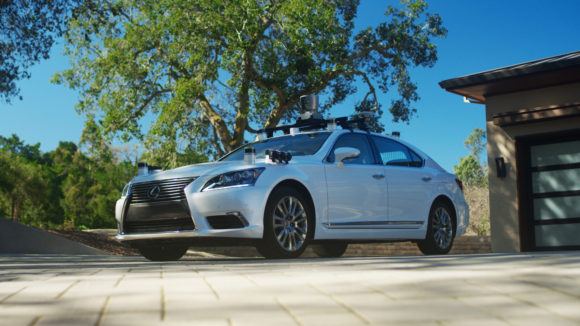The Toyota Research Institute (TRI) is exploring blockchain and distributed ledger technology (BC/DL) for use in the development of driverless cars. TRI is collaborating with the MIT Media Lab and other industry partners on ways that both businesses and consumers may share driving and autonomous vehicle testing data, manage ride-share and car-share transactions and store vehicle usage information that could be used in the setting of insurance rates.
Blockchain technology sends information over a network of independent computers, known as a distributed ledger, intended to ensure that the transaction is secure and ownership rights over the data/property are protected. TRI said it believes blockchain may create transparency and trust among users, reduce risk of fraud and reduction or elimination of transaction costs, such as fees or surcharges applied by third party institutions.
“Hundreds of billions of miles of human driving data may be needed to develop safe and reliable autonomous vehicles,” said Chris Ballinger, director of mobility services and chief financial officer at TRI. “Blockchains and distributed ledgers may enable pooling data from vehicle owners, fleet managers, and manufacturers to shorten the time for reaching this goal, thereby bringing forward the safety, efficiency and convenience benefits of autonomous driving technology.”
Through an open-source approach to software tools, TRI is creating a user consortium and hopes to stimulate more rapid adoption of blockchain by other companies developing autonomous vehicles and providing mobility services. TRI is inviting current and future partners to collaborate on further development of BC/DL technology applications in vehicle data and services.
TRI is working with several industry partners in addition to MIT Media Lab including: Berlin-based BigchainDB, which is building the data exchange for sharing driving and autonomous vehicle testing data; Oaken Innovations, based in Dallas and Toronto, which is developing an application for peer-to-peer (P2P) car sharing, vehicle access and payments with a newly created mobility token; Commuterz, a startup from Israel, is working with TRI on a P2P carpooling solution; Gem, from Los Angeles, is working with Toyota Insurance Management Solutions – Toyota’s joint venture telematics car insurance company – and Aioi Nissay Dowa Insurance Services on the usage-based insurance platform.
The firms hope to develop applications and proofs of concept for three areas:
Driving/Testing Data Sharing: Blockchain technology may allow companies and individuals to securely share and monetize their driving information and access the data contributed by others in a secure marketplace. This approach builds on a similar blockchain initiative to create digital property rights in the music industry, the Open Music Initiative. Modern vehicles are increasingly aware of their environment through onboard sensors and are increasingly connected to the cloud, roadway infrastructure and other vehicles, all of which are generating massive amounts of valuable data. Toyota believes BC/DL may create an opportunity to share driving and autonomous testing data in an environment that preserves ownership of the data by the creator.
Car/Ride Share Transactions: Tools based on BC/DL have the potential to empower vehicle owners to monetize their asset by selling rides, cargo space or even the use of the vehicle itself. The blockchain can store data about the vehicle’s usage and information about vehicle owners, drivers and passengers. This profile information can help validate a “smart contract” between two parties plus manage payment of services between them without need of a financial intermediary, thereby saving transaction surcharges. The system may also provide connectivity to vehicle functions for remote locking/unlocking doors and engine startup/shut off.
Usage-Based Insurance: The blockchain can also be used for vehicle owners to save money on their insurance rates. By allowing the vehicle’s sensors to collect driving data and store it in a blockchain, vehicle owners may be eligible to further lower their insurance costs by giving their insurance companies increased transparency to reduce fraud plus granting them access to driving data to measure safe driving habits.
According to Neha Narula, director, Digital Currency Initiative at the MIT Media Lab, the hope is that other industry stakeholders will join the effort to “bring safe and reliable autonomous vehicles one step closer to reality.”
Insurers’ interest in blockchain is growing. The Blockchain Insurance Industry Initiative B3i, which was launched in October 2016 to explore the potential use of distributed ledger technology, has grown to 15 members from its original five. They are exploring the ability of blockchain technologies to increase efficiencies in the exchange of data between reinsurance and insurance companies.
In March, PwC announced it had created a working blockchain prototype for how the technology can support claims management processes, the company said. Completed over a six-week period, PwC said, the proof of concept focuses on enhancing interactions among multiple different parties involved in a claims process (third party administrators, claims approvers and brokers).
Allianz, Europe’s biggest insurer, has tested blockchain in a natural catastrophe swap transaction.
Related:
- Toyota $1B Research Labs Near Stanford, MIT to Develop Autonomous Vehicles
- The Present Use and Promise of Blockchain in Insurance
- Blockchain Insurance Industry Initiative B3i Grows to 15 Members
- Automakers Want Regulatory Road Cleared for Self-Driving Vehicles
- Blockchain – Where Hype Meets Potential Magic: Opinion
- Allianz Expects Blockchain Tech to Expedite Cat Bond Deals
Was this article valuable?
Here are more articles you may enjoy.



 AI Needs Its Own Risk Class: Lockton Re
AI Needs Its Own Risk Class: Lockton Re  Experian Launches Insurance Marketplace App on ChatGPT
Experian Launches Insurance Marketplace App on ChatGPT  Florida Engineers: Winds Under 110 mph Simply Do Not Damage Concrete Tiles
Florida Engineers: Winds Under 110 mph Simply Do Not Damage Concrete Tiles  CFC Owners Said to Tap Banks for Sale, IPO of £5 Billion Insurer
CFC Owners Said to Tap Banks for Sale, IPO of £5 Billion Insurer 

